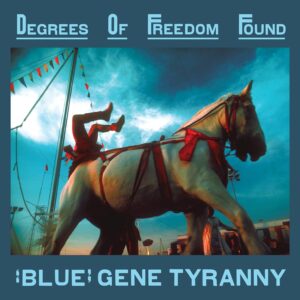Years ago, a pianist colleague specializing in new music urged me to check out an improvising/composing pianist with the unusual name of “Blue” Gene Tyranny (1945-2020). My colleague called him “the Mozart of our time” and raved about this genius. So I went to hear “Blue” Gene play a solo piano concert. God, was I bored! Tyranny seemed to noodle around for minutes on end, with no rhythm, no interesting ideas, and all at the same “mezzo everything” dynamic level. Not exactly the “new Mozart”!
However, over the years I got to know more of “Blue” Gene’s music making. I recognized his wider stylistic proclivities, ranging from pop-oriented simplicity and traditional American musical theater to free jazz, electro-acoustic works, and experimental projects. The Unseen Worlds label has assembled a six-disc collection that offers a good cross-section of Tyranny’s work from micro to macro, so to speak.
I like the gentle, chorale-like piano introduction to The Invention of Memory, and the delicate, sustained interplay between Conrad Harris’ violin and Tyranny’s piano in Confession. How to Swing a Dog is an 11-minute live improvisation where seemingly “looped” electronically-based ostinatos anchor polyrhythmic melodic lines. On the other hand, The Great Seal for two pianos (brilliantly performed by the duo Double Edge, consisting of Nurit Tilles and the late Edmund Niemann) contains stretches of arid, almost academic-sounding counterpoint that rambles on forever, giving way at one point to intense massed tremolos.
Tyranny’s early Wooden Nickels (1968) represents the composer’s first attempt to write for jazz band; its perky horn section writing wouldn’t be out of place as incidental music for a Chuck Barris TV game show production of that vintage (The Dating Game, for example).
Although certain electronic pieces suggest little more than New Age ambient music with an edge, Recollections, Songs from Aphasia showcases Tyranny’s lyrical gifts at their most inspired and focused, not to mention a mastery of setting English words that evoke Virgil Thomson’s Gertrude Stein settings. My favorite moments in Tyranny’s ensemble work The Driver’s Son occur when Tyranny plays sparse, introspective, and harmonically gorgeous solo piano, in contrast to the extended and (for my taste) archly stylized vocal narration.
Despite failing health, Tyranny himself was able to participate in selecting this collection’s contents, and provided informative booklet notes. My feelings about Tyranny’s protean, yet hit and miss artistic legacy remain ambivalent. However, there’s no doubting his genuine musicality, nor the respect he commanded in the New Music community.
































